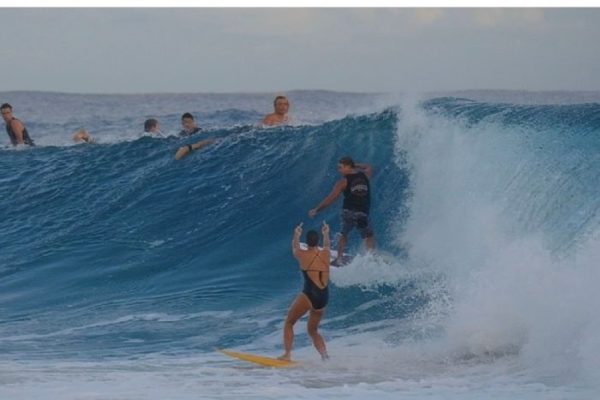 Photo: Grace Styman-Lane shows her anger at a male surfer dropping in on her at Snapper Rocks. (Supplied: Stephen Gleeson)
Photo: Grace Styman-Lane shows her anger at a male surfer dropping in on her at Snapper Rocks. (Supplied: Stephen Gleeson)Related Story: Australia’s top Indigenous surfer to train with world number one
Related Story: The surfer who became a legend overnight, and helped women win respect in the water
Related Story: Meet the Surf Witches gaining confidence in numbers at ‘blokey’ beaches
Related Story: Female surfing set to ‘skyrocket’ as major shakeup brings equal prize money
The theme of International Women’s Day is “Each for Equal”, but female surfers continue to face discrimination in the water and within the industry.
Key points:
- Former professional surfers say the sport is still struggles to accept women and gay people
- Surfing organisation are working to combat prejudice and foster inclusivity, an official says
- Surfers say conditions have improved on the whole, however, and that negative attitudes mostly come from older men
The problem has been highlighted in a documentary by Dutch surfer Juul Hesselberth, entitled “Just Go F***ing Surfing “.
Hesselberth spent three months filming in the Tweed and Gold Coast areas, following four former female pro surfers, among them Tweed Coast twins Grace and Audrey Styman-Lane.
“Male surfers do drop in on women surfers a lot and, when you ask them why, they say, ‘oh, sorry, but I didn’t think you were going to make it,'” Audrey said.
Grace said most young male surfers are supportive of women in the water, but she said the older men — the so-called hippies — had the worst attitude towards female surfers.
“They’re like, ‘save the planet, peace brother’ — and then ‘Get off my wave, bitch.’
“What hypocrites.”
Grace and Audrey said they had lost sponsors because they refused wear certain types of bikini bottoms they referred to as “G-bangers” or “dental floss”.
“We want to be seen as professional athletes,” said Audrey.
“Not sex objects.”
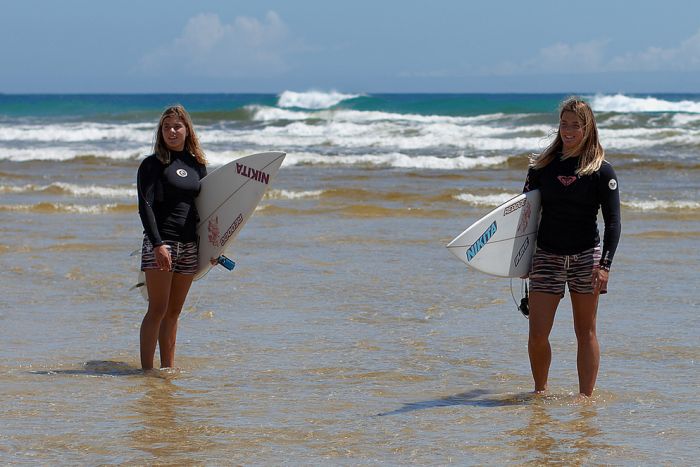 Photo: Grace and Audrey Styman-Lane say their refusal to wear certain types of swimwear risked their professional careers. (ABC News)
Photo: Grace and Audrey Styman-Lane say their refusal to wear certain types of swimwear risked their professional careers. (ABC News)Paddling towards change
Rachael Schriever of Surfing New South Wales says image remains a problem with female surfers.
“Sponsors want to push the sexy female surfer with brief outfits,” she said.
“But our organisation and the World Surfing League (WSL) are working to change that.”
Ms Schriever said women have a choice to wear brief bikinis, boardshorts or wetsuits during surfing competitions.
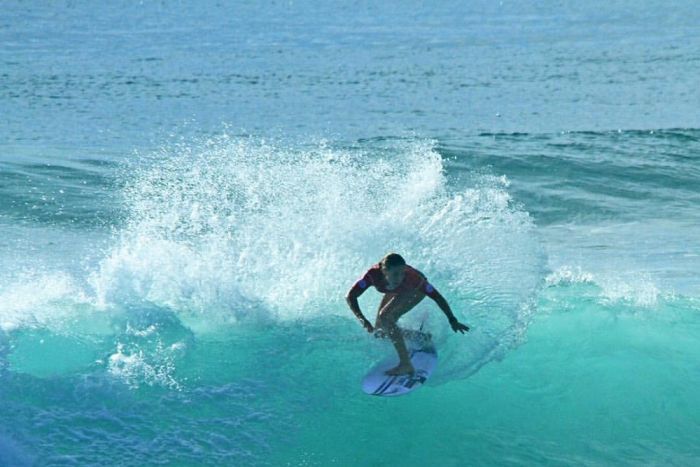 Photo: Jess Grimwood says she had to hide the fact that she was gay when she was surfing professionally. (Supplied: Jess Grimwood)
Photo: Jess Grimwood says she had to hide the fact that she was gay when she was surfing professionally. (Supplied: Jess Grimwood)Coming out, going under
Jess Grimwood said she had to hide the fact that she was gay when she was competing professionally.
“I couldn’t admit that I was gay or I’d risk losing my sponsorship,” she said.
“I know there are some male surfers who haven’t come out yet because they’re worried they’ll be dropped by their sponsor.”
Ms Schriever says a surfer’s sexuality should not matter, and that Surfing NSW and the WSL are working towards holding a surfing competition that will coincide with next year’s Mardi Gras.
“The focus needs to be on the surfer’s attitude towards the sport and their skill set,” she said.
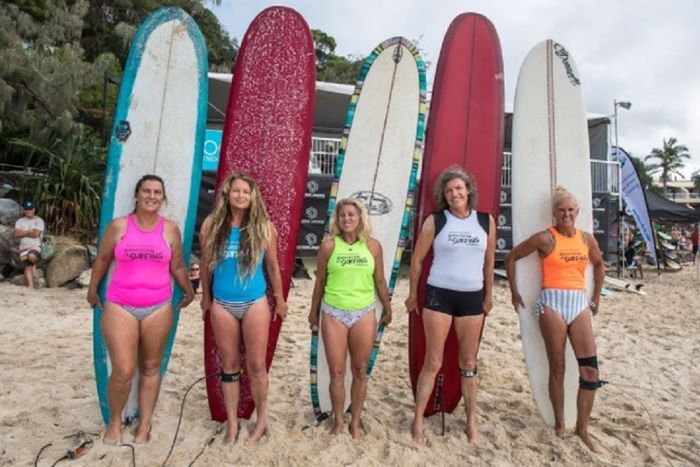 Photo: Kirsty Best says surfing helped her overcome the trauma of domestic violence. (Supplied: Kirsty Best)
Photo: Kirsty Best says surfing helped her overcome the trauma of domestic violence. (Supplied: Kirsty Best)Overcoming violence to win it all
Coolangatta surfer Kirsty Best says surfing has helped her overcome the trauma of domestic violence.
“I suffered domestic violence and withdrew from society for a long time,” she said.
“But hitting those waves in the ocean just made me alive again.”
Best was 38 when she started competing on the longboard circuit — she retired when she was 42 — and said she had to work extra hard to get recognition in competitions.
“I was older and had the wrong body type for the so-called sexy surfer girl image,” she said.
“But it made me more determined to get the best scores when competing.”
Best won national titles in 2011 and 2017.
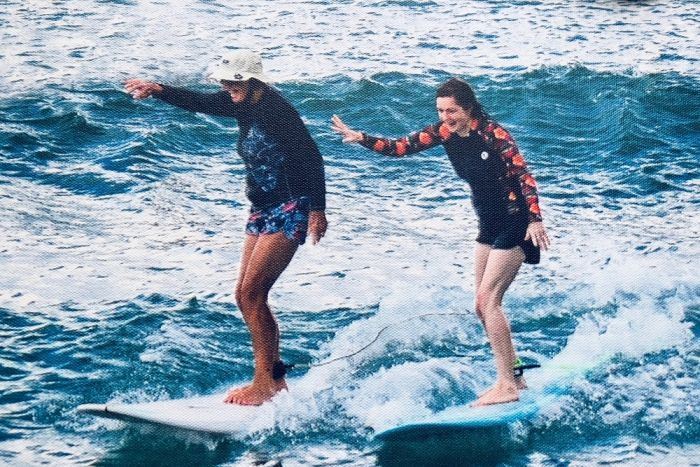 Photo: Yvonne, who suffers from rheumatoid arthritis, enjoys teaching her daughter-in-law to surf. (Supplied: Yvonne Pendergast)
Photo: Yvonne, who suffers from rheumatoid arthritis, enjoys teaching her daughter-in-law to surf. (Supplied: Yvonne Pendergast)No permission required
Yvonne Pendergast, of Byron Bay in northern New South Wales, is 72 years old and suffers from rheumatoid arthritis.
She finds surfing regularly helps her condition, but she is often told by younger surfers that she’s too old to be in the lineup.
“Yeah, sometimes they’ll come up to me while we’re waiting for a wave and tell me that I’m a granny and shouldn’t be in the water,” she said.
“But others will come along and help me carry my board to the water — so it depends on the person’s soul.”
Ms Pendergast began surfing in the 1960s, and said some of her female friends would sit on the sand and watch their boyfriends surf.
“Not me,” she said.
“I’m not going to miss out on all the fun of catching waves.”
Ms Pendergast said a young man was recently watching her surf at Wategos Beach and came running up to her as she got out of the water.
“I was a bit, ‘On yeah, what’s this about?'” she said.
“But he patted me on the back and said, ‘You were awesome out there.’
“It made me smile for the rest of the week.
“You don’t need anyone’s permission to surf.
“Just get out there and enjoy yourself.”
Topics: womens-status, discrimination, women, surfing, lismore-2480, north-lismore-2480, tweed-heads-2485, coolangatta-2535, coolangatta-4225

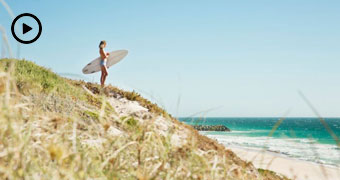


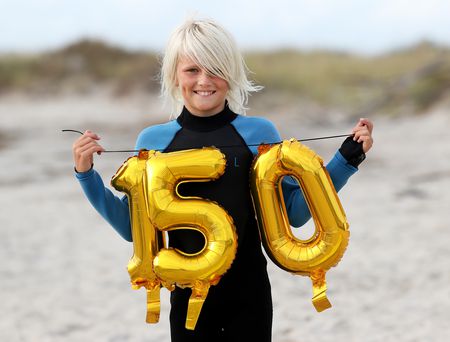

Recent Comments